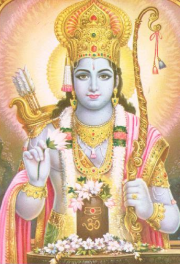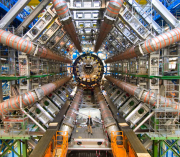 One of the things that strikes me about the idea of God is how universal that idea is. To the best of my knowledge, every society in every age has had some sort of spiritual core belief.
One of the things that strikes me about the idea of God is how universal that idea is. To the best of my knowledge, every society in every age has had some sort of spiritual core belief.
I used to state this as the assertion that every society believed in some sort of god or gods, but it was pointed out to me that Buddhists don’t actually have a god. They do have some metaphysical entities, and more importantly, Buddhism is certainly a belief in a metaphysical reality that transcends this one.
So the question is: if humans universally find themselves finding God(s), what does this mean?
It would seem to mean one of two things: First, that there is some universal twitch in the human mind that invents the idea of God to account for the nature of existence.
Alternately, it could mean that humans apprehend some aspect of reality (as we do justice and equality) that really does exist.
Atheists are quite clear on it being the former. Theists are equally clear on it being the latter.
 So while physicists search for the absurdly named “God particle,” psychologists search the human mind for the “God circuit.”
So while physicists search for the absurdly named “God particle,” psychologists search the human mind for the “God circuit.”
There has been some progress along these lines, and it may be that someday we will find God in our own minds. (That may, or may not, close the matter. Human belief is a powerful thing, and you mess with it at your possible peril.)
It may turn out that belief is a feature of evolution (wouldn’t that tweak the Creationists).
It may turn out that we need the idea of God (if not the reality) in order to form working societies. Atheists like to point out that science is very useful, since it creates refrigerators, medicine, atomic bombs and potentially lethal bacteria. Religious belief is also useful to society, since it creates charity, social cohesion, inquisitions and crusades.
Particularly powerful swords, such as chain saws, gun powder, justice, love, television, science, or religion, tend to have two edges. The key is in how we use (or misuse) them.
 Michael Shermer has a new book out, The Believing Brain, that sounds interesting. I’m hoping he addresses some of the latest science on the mechanisms of belief (the first possibility that I mentioned above).
Michael Shermer has a new book out, The Believing Brain, that sounds interesting. I’m hoping he addresses some of the latest science on the mechanisms of belief (the first possibility that I mentioned above).
I have to be honest that I sometimes find Shermer as strident and insistent about his atheism as I do any religious fanatic.
Certainty on this topic tends to repulse me regardless of from which side it comes. Both atheists and theists have a tendency to argue passionately that their beliefs must be correct. (I will give credit to atheists for — as far as I know — not actually killing anyone over it.)
But I am sometimes reminded of alcoholics and drug users who are also very insistent that you join them in their worldview and practice. Belief on the level of such certainty does sometimes strike me as an addictive drug. One of the few things of which I’m certain is that little is certain (another of life’s ironies).
The thing is, both theism and atheism are matters of belief at this point. Atheists are just as hard-core in their belief in a specific worldview as theists. Only the nature of their Belief is different.
It seems interesting to me that we accept many universal human perceptions, but we argue so much over this one. That all humans (normally) see color or spatial relationships bothers no one. That so many societies have a perception of abstractions, such as Honor, Truth or Justice, also seems easy to accept.
 But a perception of God drives atheists (and some scientists) crazy. That universal perception, they feel, must be wrong.
But a perception of God drives atheists (and some scientists) crazy. That universal perception, they feel, must be wrong.
Color and spatial relationships are testable and quantifiable, which accounts for their acceptance.
Social abstractions are less so (in fact, many scientists look down on social sciences as not being True Science at all), but still aren’t the quagmire that belief seems to invoke.
With so much heat, it almost seems there has to be some fire here somewhere. When something is so compelling and universal, I think it begs for an explanation.
I want to close this with the observation that belief in a spiritual metaphysics and worldly religions are two very distinct topics.
I am not a fan of most worldly religions. To some extent, I consider the concept an oxymoron. A spiritual metaphysics is, pretty much by definition, not a worldly thing. These organizations that feed off our (putative) spiritual connections are just that: organizations. They often suffer from the same flaws as any organization. They are run by flawed humans and often serve the primary purpose of surviving and growing.
[This is the second of a series of posts about spirituality. The first is Big Bang? Let there be Light?]












August 3rd, 2011 at 3:10 pm
I’d be curious to know how you feel about the argument from desire that C.S. Lewis found so compelling. It seems sort of in the same vein as this post.
http://en.wikipedia.org/wiki/Argument_from_desire
August 3rd, 2011 at 3:35 pm
Thanks for reading and thanks for the link! Lewis’ argument does seem similar. One difference is that Lewis looks at desire, whereas I look at perception. They may be the same thing; I’d have to ponder that. I also don’t grant the conclusion of the syllogism as necessarily correct, but I find the argument worthy of serious consideration. My article has no factual conclusion (faith, after all, is a personal choice), but attempts to examine the question. Freud (and others, such as Shermer) may well be correct, but then again, maybe the smoke comes from real fire. Ultimately, you cannot prove; you can only choose.
August 4th, 2011 at 8:00 am
The thing about “the debate” that concerns me is that a world without a God whom cares is a world without morals. Morals in a godless world are made up and and therefore can change as society changes. (Ever read the book “The Giver” by Lois Lowry: 5th/6th grade book?) I have recently been concluding that I don’t want to live in that world or see myself in that world. I would be a very different person.
August 4th, 2011 at 2:53 pm
I have not read The Giver. Deriving a moral foundation from pure logic is a bit of a trick. I plan to touch on this in a post down the road (first I need to brush up on Kant and other philosophers who’ve tried this). The problem seems to be that, absent an external moral basis, you need make some assumptions; things you take as given. “All humans are equal.” But logically they’re clearly not by most measuring sticks (faster, taller, smarter, happier, etc.). If we are, indeed, all God’s children, that’s an equalizer. Otherwise you can only try to appeal to an abstract ideal that seems to have no demonstrable foundation.
May 27th, 2013 at 9:46 pm
Yes. I like what you said in this comment. When I use the word “equality,” that’s basically what’s in my mind: we are all God’s children. It’s not a religious conviction, but rather one level or perhaps perspective of humanity where we agree that we all possess intrinsic worth and thereby deserve to be regarded with a measure of respect. And this can be opened to include the animal kingdom as well, all of which is considered “God’s creation.” But, of course, it asks the question of what we mean by “God,” and then the fight lifts off.
But I can see where there’s a moral sense that tells us the above is true, that on one plane we’re all equal in some respect. It has to do with consciousness and being alive, but more than that I also think it may have to do with reverence for potential. I don’t know. But I sure do know that “equality” apparently means a lot of different things depending on who you ask, with atheists rejecting this idea because it’s linked in with religions, and then devout people taking it too far and demanding that if we accept this, we must accept the whole enchilada proposed by their respective religion. Tends to make pondering aloud such a pain.
May 28th, 2013 at 7:13 pm
Yeah, it’s really hard to define morality if you can’t define equality, since that seems the core principle of morality. But equality is hard to define without reference to morality, so it gets circular. Ultimately, they’re kind of the same thing. Once you determine that, “All {people} are created equal,” the rest proceeds from that.
The problem is, what’s the real basis for determining equality between all people? Consciousness, and especially potential (or maybe purpose?), is as good as an answer gets. (Potential is a tricky concept morally. The movie Minority Report (the underlying story, really) touches on this a bit. I’ve been watching Looper, which really touches on the idea. The canonical Stranded People With Scant Resources Moral Conundrum involves potential. Do you kill a few now for the potential of saving more later? What about the potential of immediate unexpected rescue of all? What about the potential of rescue never arriving and all dying? Like I said, moral analysis once you include potential gets tricky.)
Consciousness makes it interesting. There does seem a pretty clear gap between all “conscious” animals and us. Some think that gap is smaller than others, but humans do seem squarely on one side of that gap. I like the Sebald quote, “Men and animals regard each other across a gulf of mutual incomprehension.” But one still has to make an argument for why consciousness is worthy of moral equality. The problem remains that, by just about any measure, consciousnesses are different.It’s really hard to find an objective basis for equality!
Yet for all that, from Kant to Hemingway, we find the idea that when it comes to morality… you just know it when you see it.
A favorite fictional character, Terry Pratchett’s Granny Weatherwax, once put it, “Immorality begins when you start treating people like objects.” That’s not a bad definition. It just might be the best I’ve heard.
May 27th, 2013 at 10:02 pm
Love this blog article. 🙂
“Particularly powerful swords, such as chain saws, gun powder, justice, love, television, science or religion, tend to have two edges. The key is in how you use (or misuse) them.”
YES.
“The thing is, both sides are matters of faith at this point. Atheists are just as hard-core in their belief in a specific worldview as theists. Only the nature of their Belief is different.”
YES.
As I think you already know, I see shades of gray between “hard” or “formal” sciences and the social and psychological realm leading over into the philosophical, the arts, and studies of history and the like (basically the human end of the of spectrum). But I don’t get how that lessens the importance of these other fields of inquiry, though they may not qualify as fully and truly scientific overall, that is unless we place the scientific on a pedestal (which is common today). If we could back off doing so, we’d be open to the importance of exploration all across the board, even where science and mathematics alone can’t provide sufficient answers. There’s no shame in admitting the limitations of science, in realizing it’s one lens but not necessarily the ultimate one when it comes to examining every single aspect of life. That’s about as articulate as I know how to be on that topic, but it is fascinating when we get outside of the science-worshiping mindset and let more light shine in. Unfortunately it’s becoming popular to consider that to be primitive thinking. 😛
And yes, religions are organizations that limit inquiry of this nature as well. Like what you had to say on that.
No need to reply since I read you’re stressing over the big retirement day approaching. Just letting you know I’m reading and appreciating what you’re putting out here. 😉
September 14th, 2013 at 12:27 pm
Even so, I’ve seriously dropped the ball on this conversation; my apologies (to the point I wonder if you’re even out there anymore). I’ve really enjoyed our conversations, but life has been having the effect of muting me lately. Just can’t seem to generate the interest in it anymore… I’ve always been pretty sure I was not ever suffering from (clinical) depression, because there’s always been a lot of laughter and joy to go along with whatever darkness obtained. Recently,… I’m not so sure anymore. There is still joy and laughter, but this business of losing interest in so many things alarms me a bit. I just find it all so tiresome and empty lately. [shrug] Whatever.
Maybe it’s just reflections on work… the long struggle to have quality and ability recognized, the final recognition that what I bring to the table wasn’t valued, except by a few who actually benefited from the work. They didn’t value what I brought to the table, and they did value things I just can’t provide. I’ve found a similar thing here in WordPress… after two years I thought I’d have found more people of like minds. But they’ve been far and few between. You’re certainly one, and I know a couple others, but where did all the others go?
Ah, well, so it goes. Might be temporal blues. Today I begin my 59th ride around the sun. I look back on a past of largely unrecognized, but worthy, accomplishments and at a present that seems no gift. More and more I feel like, Okay, I gave it my best shot, and maybe that was wanting, but I am what I am, and this is where we are. So now what? What’s next??
But to the matter at hand: I find myself surprised at scientists (and science fans) who so adamantly deny anything outside the physical realm. (Why is it that I can never remember how to spell “realm” correctly and always have to look it up?) And I’m equally surprised at how reluctant they are to attempt to explore outside that realm. Gnostic Atheism seems just as close-minded as Gnostic Theism.
I admit I go back and forth on whether spirituality is an aspect of nature that can be examined (usefully) by science, or whether it is Yang to the Yin of the material world (and therefore completely outside the purview of science).
Maybe a bit of both, which would be entirely Yin/Yang-like.
September 15th, 2013 at 4:12 am
“Ultimately, you cannot prove; you can only choose. Faith, after all, is a personal choice.”
I think you’ve nailed it with those lines in your comments.
Wyrd, you’re probably right in thinking it just could be temporal blues. Things are going to be ok for you sooner or later. We all go through that phase every now and then. For most, it’s a never-ending cycle. More often, I simply have to remind myself I should be grateful to still be alive and not be in any physical pain – and the fact that I’m more fortunate compared to other people here in my country.
The truth is, I wouldn’t want to become a hard-core atheist. There are times when I wish there was a God to whom I can give thanks for all the blessings I’ve received in my life. I still sometimes find myself praying. It helps, somehow.
I know, I’m a bundle of contradictions :-).
I don’t understand myself when it comes to the subject of God. But who does? 🙂
September 16th, 2013 at 10:27 am
That yearning is possibly what drives us to create God in the first place. Our logic may say one thing, but per the very old saying, “There are no atheists in the trenches.”
Injustice and suffering make us dearly wish the universe isn’t random, isn’t uncaring, isn’t utterly pointless. (But the reality just may be that it is.)